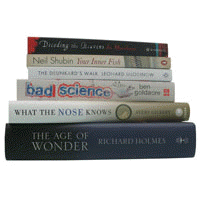Royal Society Prizes for Science Books 2009
The judges remained on remarkably good terms in their meeting
to select the shortlist - with a distinct lack of raised voices
or thrown books. That's not to say their decision was easy - and
here is that decision, the shortlist.
It's a transatlantic race between the American academics and
the UK's journalists and biographers: with three books written
by US academics and three written by British journalists and
biographers. All of the authors on the shortlist are new to the
Royal Society Prize for Science Books.
The winner will be announced on 15 September 2009.
 The
shortlist
The
shortlist
On announcing the shortlist, Sir Tim Hunt FRS, Chair of
the judges, said: "We were astonished and delighted to find
so many fascinating books on such a wide variety of topics.
There's clearly a large audience for books that explain science
clearly and gracefully, and no shortage of authors. Choosing a
final list of six books from the big boxes of books that arrived
on our doorsteps over 120 books were submitted was a challenging
pleasure."
What the nose knows: The science of scent in everyday life
by Avery Gilbert (Crown Publishers)
The judges said: "One of the things you really appreciate
about this book is the feeling that you are in the presence of
someone who really knows the subject. He's worked in the
fragrance industry and in academic research and engagingly leads
you into his fascinating world. Since reading this book we've
all thought more about the scents around us and our
oft-neglected sense of smell."
Bad science by Ben Goldacre (Harper Perennial)
The judges said: "We found this book was funny, accessible
and offered much more than just a collection of Ben Goldacre's
excellent columns in the Guardian. He attacks and debunks
pseudoscience, which is really vital given how much is out there
and how important the issues are to our lives. There's more to
be said about some of the subjects, like the MMR vaccine
scandal, and we're looking forward to the sequel."
The Age of Wonder: How the Romantic generation discovered the
beauty and terror of science by Richard Holmes (HarperPress)
The judges said: "We all thought this was a fantastic,
enlightening and inspiring book, taking characters from the
history of science and making them come alive. Richard Holmes
has managed to seamlessly merge science, social history and
literary history in a wonderful narrative, putting science in a
wider context and producing a truly enthralling read."
Decoding the heavens: Solving the mystery of the world's first
computer by Jo Marchant (William Heinemann)
The judges said: "This is a rattling good detective story
exploring a subject that we were amazed that we hadn't heard
more about. Learning about the extraordinary capabilities of the
ancient civilisations was fascinating and left us all wondering
what other incredible pockets of knowledge have been lost at the
bottom of the sea or otherwise forgotten."
The drunkard's walk: How randomness rules our lives by
Leonard Mlodinow (Penguin)
The judges said: "This book is well-written, enlightening and
very funny at times. We could see people reading it and finding
their perspective of odds and probability being fundamentally
altered it definitely puts you off buying a lottery ticket or
having a gamble on the roulette wheel!"
Your inner fish: The amazing discovery of our
375-million-year-old ancestor by Neil Shubin (Penguin)
The judges said: "This is a charming and delightful book; not
often that a science book can be described in such terms! The
author, an expert palaeontologist with a deep understanding of
anatomy and animal development, still manages to explain things
clearly, gracefully and eloquently - we all felt he'd be a great
person to meet in the pub for a chat and a drink!"
Find out
more about the books and the authors on our website.


 The
shortlist
The
shortlist